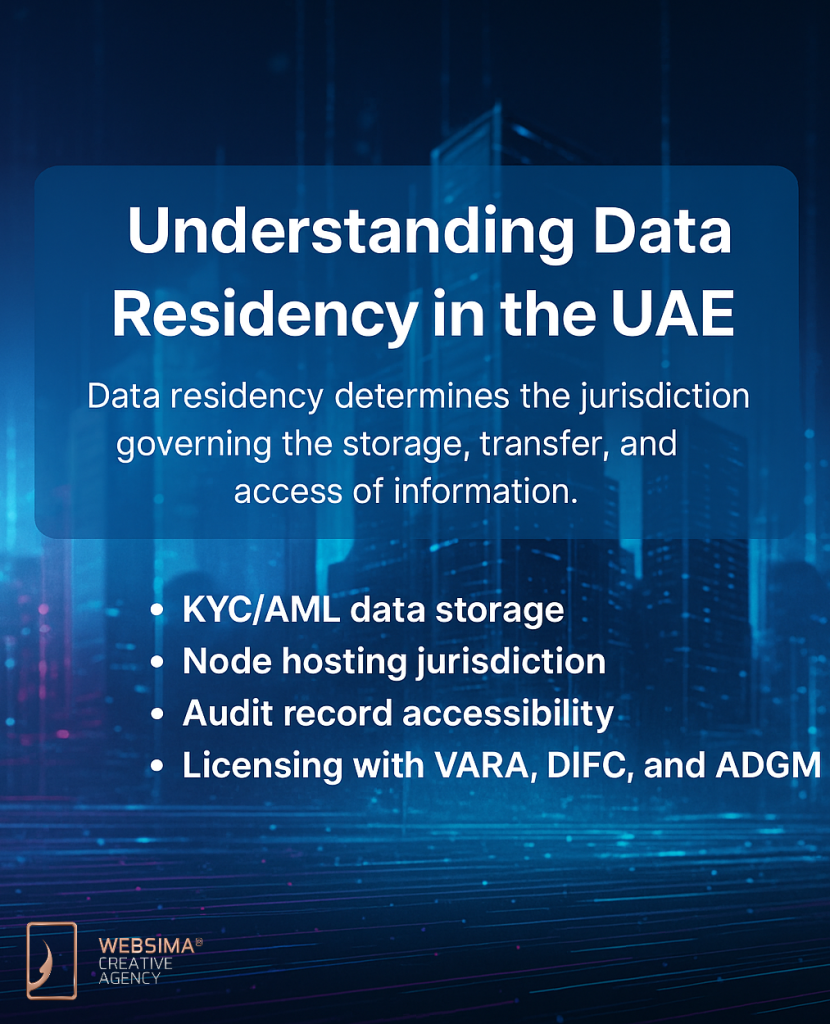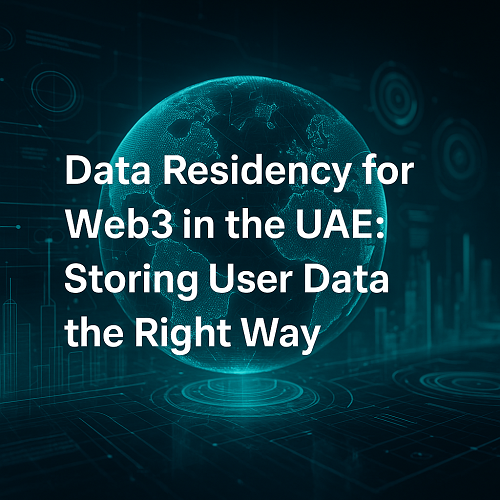Table of Contents
- Introduction: Why Data Residency Matters in the Web3 Era
- Understanding Data Residency in the UAE
- Web3 Storage: Centralized vs. Decentralized
- UAE Legal Frameworks Governing Web3 Data Residency
- Federal Data Protection Law (PDPL 2022)
- DIFC Data Protection Law
- ADGM Data Protection Regulations
- VARA Technology & Information Rulebook
- Cross-Border Data Transfers
- Why Web3 Startups Must Localize Data Storage
- Implementation Challenges
- How Decentralized Storage Networks Enable Compliance
- Case Study: A Supply-Chain dApp in Dubai
- Mistakes to Avoid
- Risks and Challenges
- Market Outlook 2025–2030
- FAQs
- Final Thoughts
- Websima’s Role
Introduction: Why Data Residency Matters in the Web3 Era
In the age of decentralization, user data is no longer confined to a single database—it’s distributed, replicated, and often stored across multiple jurisdictions.
For UAE-based projects, web3 data residency UAE is no longer optional. It defines where blockchain-related information is physically stored, under what laws it falls, and who can access it.
The UAE’s growing Web3 ecosystem—driven by the Dubai Virtual Assets Regulatory Authority (VARA), DIFC, and ADGM—requires projects to align innovation with data-governance compliance.
Understanding this balance ensures long-term regulatory trust and business sustainability.
Partnering with @Ignyte_AE and @DIFC to open Web3 opportunities across the UAE.
We’re providing startups with what they need most: education, mentorship from industry leaders, and practical tools to build.
Excited to see what this community creates. pic.twitter.com/Z3yGd1Iydn
— Richard Teng (@_RichardTeng) October 1, 2025
Understanding Data Residency in the UAE

Data residency determines the jurisdiction governing the storage, transfer, and access of information.
In Web3, where blockchains replicate data globally, this becomes complex. For UAE companies, residency dictates how smart contracts, decentralized databases, and off-chain metadata are handled.
It directly affects:
- KYC/AML data storage
- Node hosting jurisdiction
- Audit record accessibility
- Licensing with VARA, DIFC, and ADGM
Web3 Storage: Centralized vs. Decentralized
Centralized storage (AWS, Azure, Oracle Cloud) offers clarity on physical location but can conflict with decentralization ideals.
Decentralized storage (IPFS, Arweave, Filecoin) shares and distributes files across global nodes, improving resilience but complicating UAE data-residency compliance.
Modern projects increasingly adopt hybrid architectures, combining on-chain verification with UAE-based encrypted metadata servers.
UAE Legal Frameworks Governing Web3 Data Residency
The UAE provides a unique multi-layered regulatory environment:
federal law applies nationally, while DIFC, ADGM, and VARA each impose additional data obligations on blockchain entities.

1. Federal Data Protection Law (PDPL 2022)
The PDPL (Federal Decree-Law No. 45 of 2021) regulates the processing, transfer, and storage of personal data.
Read official summary: UAE Government – Data Protection Laws
It requires entities to:
- Obtain explicit consent for processing.
- Prevent data transfers to countries lacking equivalent protection.
- Implement security measures for user-identifiable data.
For Web3, even wallet or transaction metadata may qualify as personal data if it links to an individual identity.
2. DIFC Data Protection Law (Law No. 5 of 2020)
The Dubai International Financial Centre (DIFC) operates an independent GDPR-style regime.
Official page: DIFC – Data Export & Sharing
Key requirements:
- Lawful and transparent processing
- Defined purposes for data exports
- Adequacy assessments for cross-border transfers
Relevance for Web3: DIFC-licensed dApps must ensure validator nodes and storage providers comply with these export obligations.
3. ADGM Data Protection Regulations (2021)
Abu Dhabi Global Market’s rules align closely with GDPR.
Reference: ADGM – Data Transfers Brochure (2025)
They require:
- Controller/processor accountability
- Secure data transfers
- Explicit user-rights management
For Web3: DAO foundations and token issuers registered in ADGM must host sensitive KYC data within compliant or approved jurisdictions.
4. VARA Technology & Information Rulebook (2025)
The VARA Technology & Information Rulebook (2025) sets the benchmark for cybersecurity and data handling by Virtual Asset Service Providers (VASPs).
It mandates:
- All transactional data and logs remain on secure UAE-based or regulator-approved servers.
- AML, KYC, and audit records be retained for a minimum of five years.
5. Cross-Border Data Transfers
Cross-border data movement is heavily scrutinized.
According to Clifford Chance – Data Transfers in UAE and KSA (2025), companies must document safeguards before storing or processing data outside the UAE.
For decentralized networks, that means ensuring encrypted copies or mirrors remain in local data centers.
Why Web3 Startups Must Localize Data Storage
Localizing storage strengthens trust with users and regulators.
- Eases licensing with VARA, DIFC, and ADGM.
- Demonstrates accountability to investors.
- Mitigates cross-border transfer penalties.
- Builds brand credibility in an increasingly compliance-driven market.
A compliant hybrid design keeps proofs on-chain and private data encrypted within UAE cloud or on-premise nodes.
Implementation Challenges
- Overlapping Jurisdictions: Federal, DIFC, ADGM, and VARA frameworks intersect.
- Immutable Ledgers: “Right to be forgotten” conflicts with blockchain permanence.
- Global Node Distribution: Difficult to trace physical locations.
- High Hosting Costs: Sovereign-cloud and local-node setups increase OPEX.
- Rapid Regulation Evolution: Rulebooks and adequacy decisions update yearly.
How Decentralized Storage Networks Enable Compliance
Leading storage networks now support geo-fencing and selective replication:
- Filecoin Plus lets developers restrict storage to specific geographies.
- Arweave gateways can be deployed within UAE jurisdictions.
- Hybrid Oracles can store metadata locally while keeping on-chain proofs global.
Such designs preserve decentralization while satisfying web3 data residency UAE requirements.
Case Study: A Supply-Chain dApp in Dubai
A UAE logistics dApp tracks goods using blockchain:
- On-chain hashes verify authenticity.
- Off-chain customer data sits in ADGM-approved sovereign cloud storage.
- AML/KYC records remain under VARA’s jurisdiction.
Outcome: fully decentralized verification with local legal compliance—an ideal blueprint for other Web3 ventures.
Mistakes to Avoid
- Assuming Blockchain Equals Anonymity — metadata may still reveal identities.
- Ignoring Outbound Transfer Controls — cross-border IPFS mirrors can trigger violations.
- Skipping VARA/DIFC registration — if you process user data, you’re regulated.
- Neglecting Transparency — users must know where their data resides.
- Using Non-Compliant Cloud Providers — always confirm UAE data-center presence.
Risks and Challenges
- Legal ambiguity: rules evolve faster than codebases.
- Cybersecurity exposure: decentralized systems widen attack surfaces.
- Cost inflation: local node hosting can double infrastructure spend.
- Reputational damage: non-compliance threatens licensing.
Market Outlook 2025–2030
By 2030, localized data infrastructure will be standard for UAE Web3 compliance.
With ADGM’s strengthened export guidelines and VARA’s 2025 rulebooks, data residency will become a licensing prerequisite.
The UAE’s sovereign-cloud strategy and Web3 investment roadmap both prioritize digital sovereignty.
Expect:
- Expansion of UAE-based validator hubs.
- DIFC-certified digital-custody and data-escrow services.
- Blockchain analytics tools automating residency proof.
Compliant data architecture will become a competitive advantage across DeFi, tokenization, and digital-ID ecosystems.
Frequently Asked Questions (FAQs)
1. What is Web3 data residency UAE and why does it matter for blockchain projects?
Web3 data residency in the UAE ensures that blockchain and decentralized applications store, process, and replicate user data within UAE jurisdiction. This matters because PDPL, VARA, DIFC, and ADGM frameworks all require companies to retain personal or transactional data locally or under approved transfer mechanisms. For Web3 startups, complying with these laws builds regulatory trust and makes future licensing smoother.
2. How can Web3 developers comply with UAE data protection and residency laws?
Developers should use UAE-based servers or sovereign cloud providers, encrypt all personally identifiable data, and maintain on-chain/off-chain separation. Metadata, KYC, and AML logs should remain within UAE borders. Following the VARA Technology and Information Rulebook 2025 and the UAE Data Protection Law helps ensure compliance.
3. Can blockchain nodes or validators be hosted outside the UAE under Web3 data residency regulations?
Yes, but with strict conditions. If any validator or node is hosted abroad, data mirroring and encryption are mandatory. UAE-registered blockchain operators must maintain a copy of all user-related information within local data centers to satisfy PDPL and DIFC residency rules. Failure to do so can result in regulatory action from VARA or ADGM authorities.
4. What are the key penalties for non-compliance with UAE data residency and VARA regulations?
Violating data-residency or protection requirements can lead to fines of up to USD 100,000, revocation of operational licenses, or suspension of Web3 services. DIFC and ADGM also impose administrative penalties for unapproved data transfers. These fines underline why compliance with Web3 data residency UAE standards is crucial for blockchain firms.
5. How can Web3 startups prove compliance with UAE data protection and residency frameworks?
Startups must maintain evidence of UAE-hosted nodes, data-center certifications, and encrypted storage solutions. Regular audits, consent records, and technical documentation of residency measures serve as proof of compliance. Working with a licensed blockchain compliance partner like Websima ensures continuous alignment with VARA, DIFC, and ADGM expectations.
Final Thoughts
Web3 data residency UAE represents more than a legal obligation — it’s a strategic advantage for blockchain builders aiming to operate confidently in one of the world’s most forward-thinking digital economies.
As Dubai and Abu Dhabi position themselves as global Web3 hubs, regulators are crafting a data ecosystem rooted in trust, sovereignty, and user protection. The convergence of blockchain transparency with strong local governance ensures that the UAE remains a safe yet innovative jurisdiction for both developers and investors.
For the next generation of dApps, DAOs, and tokenization platforms, success will depend not just on technical innovation but on how effectively they embed compliance and residency safeguards into their architecture.
By 2030, the projects that thrive in the UAE will be those that make data protection, user consent, and residency integral to their technology stack—not afterthoughts.
If you’re building a decentralized business in the Emirates, treating data residency as part of your competitive strategy is not just smart—it’s essential.
Websima’s Role
Websima helps Web3 and blockchain ventures build UAE-compliant infrastructure.
Our experts design hybrid architectures integrating:
- Smart-contract development with privacy layers
- DIFC/ADGM-aligned data governance
- VARA-compliant cloud and on-premise storage
Work with Websima to secure your Web3 data residency UAE strategy.





